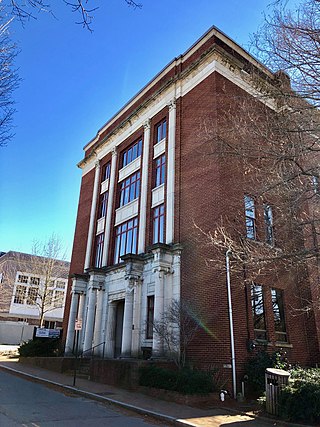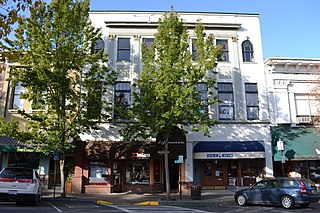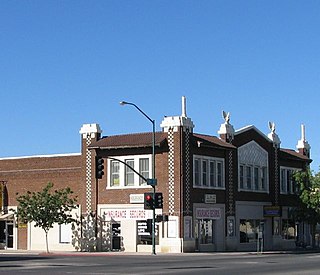
S. R. Crown Hall, designed by the German-American Modernist architect Ludwig Mies van der Rohe, is the home of the College of Architecture at the Illinois Institute of Technology in Chicago, Illinois.

The Masonic Temple Building located at 133 Fayetteville Street in Raleigh, North Carolina was the state's first reinforced concrete skyscraper. Constructed in 1907 by Grand Lodge of North Carolina, the building represents the growth of Raleigh in the early 20th century and rise of the influence of Masons. The Masonic Temple Building was added to the National Register of Historic Places in 1979 and is a Raleigh Historic Landmark.

The Religious Structures of Woodward Avenue Thematic Resource (TR) is a multiple property submission to the National Register of Historic Places which was approved on August 3, 1982. The structures are located on Woodward Avenue in the cities of Detroit and Highland Park, Michigan.

The Masonic Lodge 570 building is a historic Moderne style building in San Angelo, Texas. The building was constructed during 1927-31 as a commercial space plus a meeting hall for San Angelo Lodge #570. It was listed on the National Register of Historic Places in 1988.

The Monroe County Museum is a historic building located in Sparta, Wisconsin. It was constructed in 1923 as a meeting hall for a local Masonic Lodge, and was listed on the National Register of Historic Places in 1987 under the historic name "Sparta Masonic Temple".

The Old Brick Post Office in Wickenburg, Arizona was built between 1909 and 1915. It served first as a grocery store and printing office, and eventually served as a post office. It was the office of the newspaper the Arizona State Miner in 1940.

Wickenburg High School is a high school in Wickenburg, Arizona under the jurisdiction of the Wickenburg Unified School District. It is double-listed on the National Register of Historic Places in Arizona. The original Colonial Revival high school and annex were completed in 1925 and 1935, respectively. In 1934, the Works Progress Administration-built gymnasium was completed in a Moderne style. It is the town's only WPA building and the larger of two cast-in-place concrete structures in the town; it also is separately listed. The two buildings were put on the NRHP at the same time. In 1999, the high school moved to a new building.

The Masonic Hall in Waynesville, North Carolina is a historic Masonic Lodge constructed in 1927 as a meeting hall for a local area Masonic Lodge.

The Ashland Masonic Lodge Building is a historic building located in Ashland, Oregon. Constructed in 1909 as a meeting hall for a local Masonic lodge, it was listed on the National Register of Historic Places in 1992.

The Barre Downtown Historic District encompasses the historic commercial and civic heart of the city of Barre, Vermont. Extending along Main Street from City Park to Depot Square, this area was developed quite rapidly in the 1880s and 1890s, when the area experienced rapid growth due to the expansion of the nearby granite quarries. It was listed on the National Register of Historic Places in 1979.
The Brown-Pilsbury Double House is a historic two-family house at 188–190 Franklin Street in Bucksport, Maine, United States. Built c. 1808, it is an architecturally distinctive and regionally rare example of an early 19th-century wood frame duplex. It was listed on the National Register of Historic Places in 1997.
Michael Sullivan was a stonemason who in the 1920s built various historical structures of fieldstone in Casa Grande. He also built a monument in the town of Sacaton, Arizona, dedicated to Pvt. Matthew B. Juan, a Native American, who was the first Arizonan to die in World War I.

Damon Hall, also known as Hartland Town Hall, is located at the junction of United States Route 5, Quechee Road, and Vermont Route 12 in the village center of Hartland, Vermont. Built in 1914-15 as a memorial to the locally prominent businessman William E. Damon, it is a fine local example of Colonial Revival architecture, and has served the town in many capacities since its construction. It was listed on the National Register of Historic Places in 1988.

Oriental Lodge No. 500, known today as Prince Hall Masonic Temple, is a historic building located in Indianapolis, Indiana, United States. It was designed by Rubush & Hunter and others and completed in 1916. It is a four-story, rectangular, steel frame and reinforced concrete structure with brick exterior walls. It has terra cotta decorative elements that are interpretations of Islamic architecture of the Middle East, North Africa, and Spain.
The Dove Creek Baptist Church, in Elbert County, Georgia, was built in 1880. It was listed on the National Register of Historic Places in 1987.
The D. M. Francis House, at 1456 Meade Lane in Flagstaff, Arizona, is a historic bungalow house which was home of a large-scale sheepman. It was built in 1917 and was listed on the National Register of Historic Places in 1986.

The Douglas Historic District includes the commercial area of Douglas, Arizona, a mining company town established in 1901. The dates of the buildings' construction range from 1901 to 1935. The district is bordered on the south by the buildings on G and H Avenues between 15th and 8th Street, and lie only eight blocks from the United States - Mexico border. The District includes architectural styles ranging from Queen Anne to Bungalow to Period Revival. One of the most interesting features is Church Square, which contains four churches in a single block. In 1930 the square was featured in Ripley's Believe It or Not, as the only block in the world which contained four churches: Grace Methodist, St. Stephen's Episcopal, First Baptist, and First Presbyterian.














